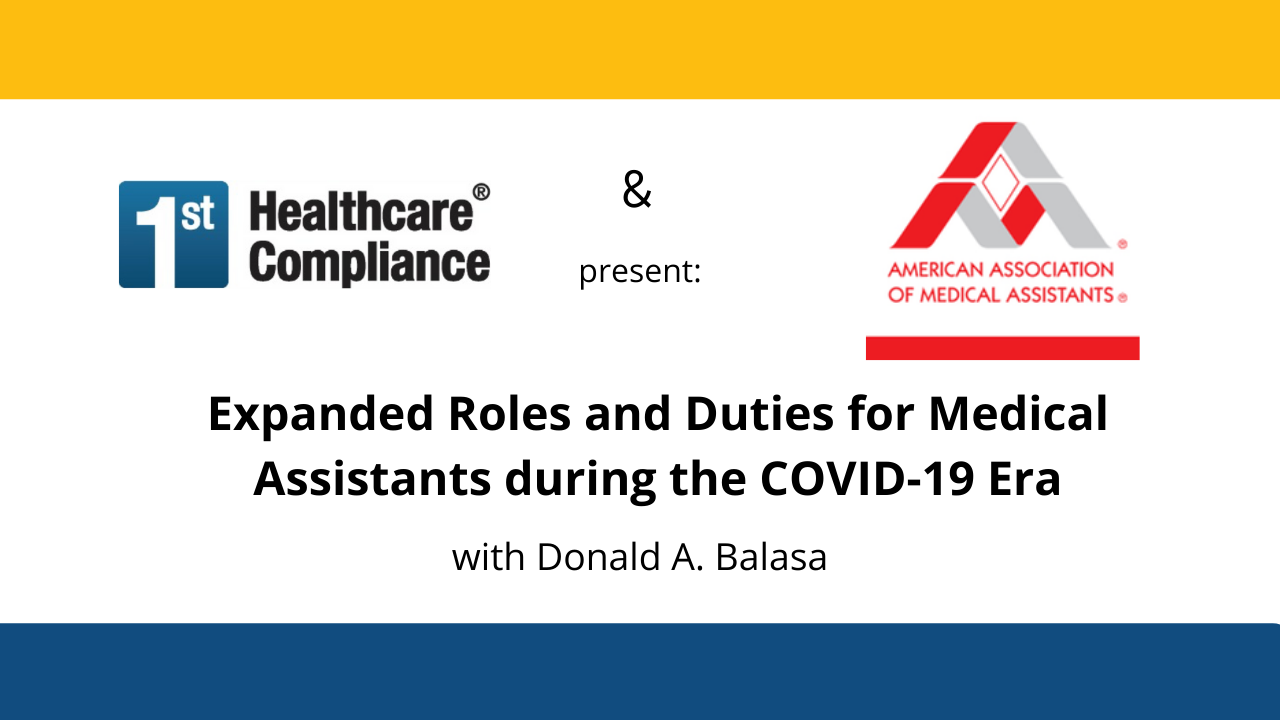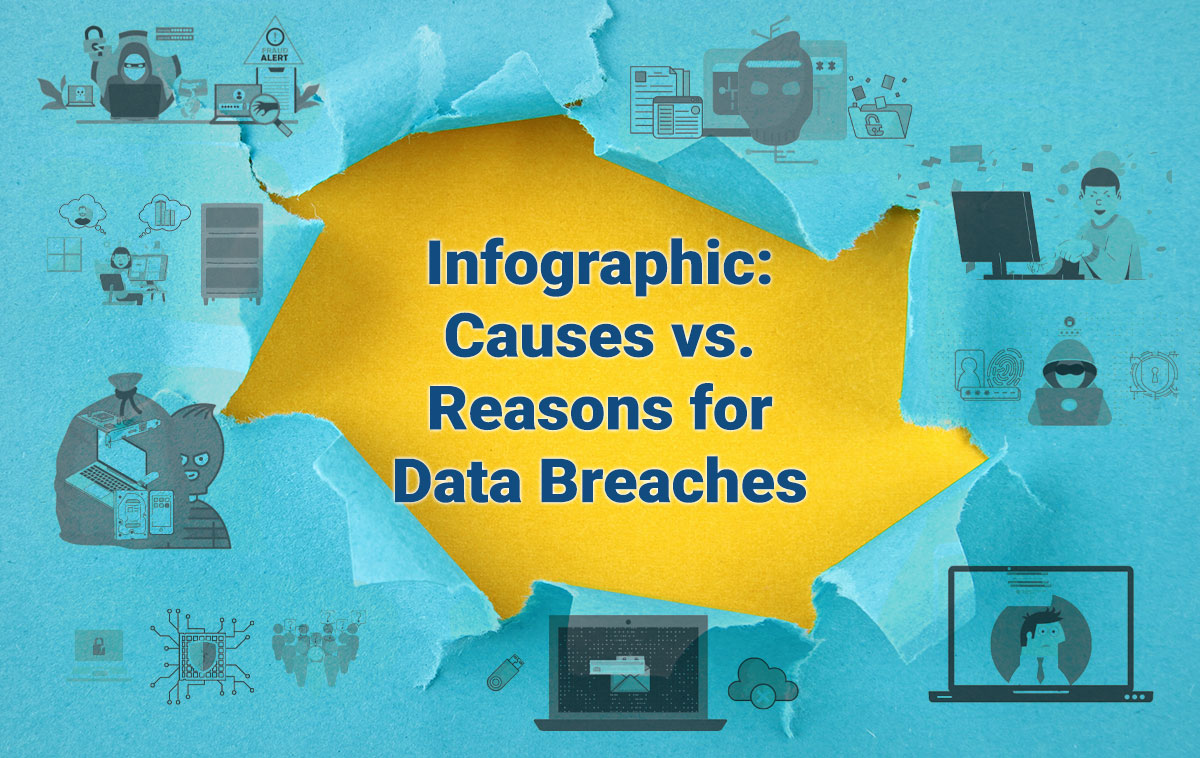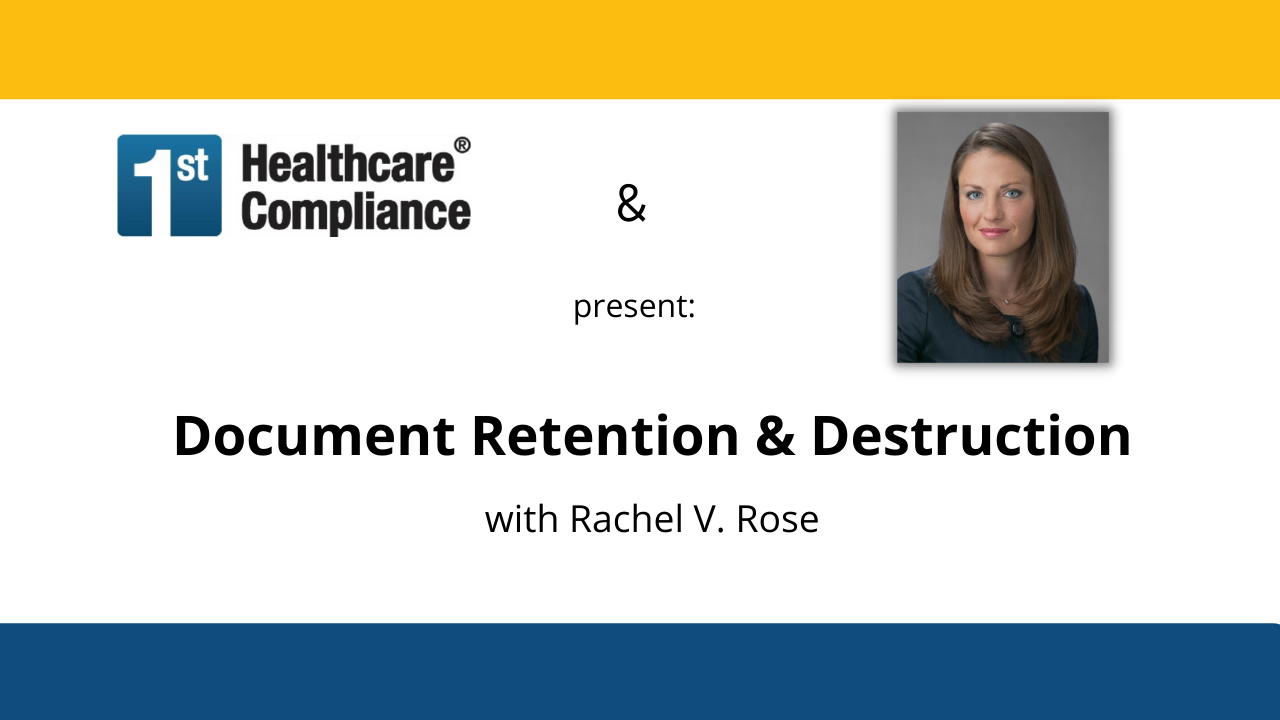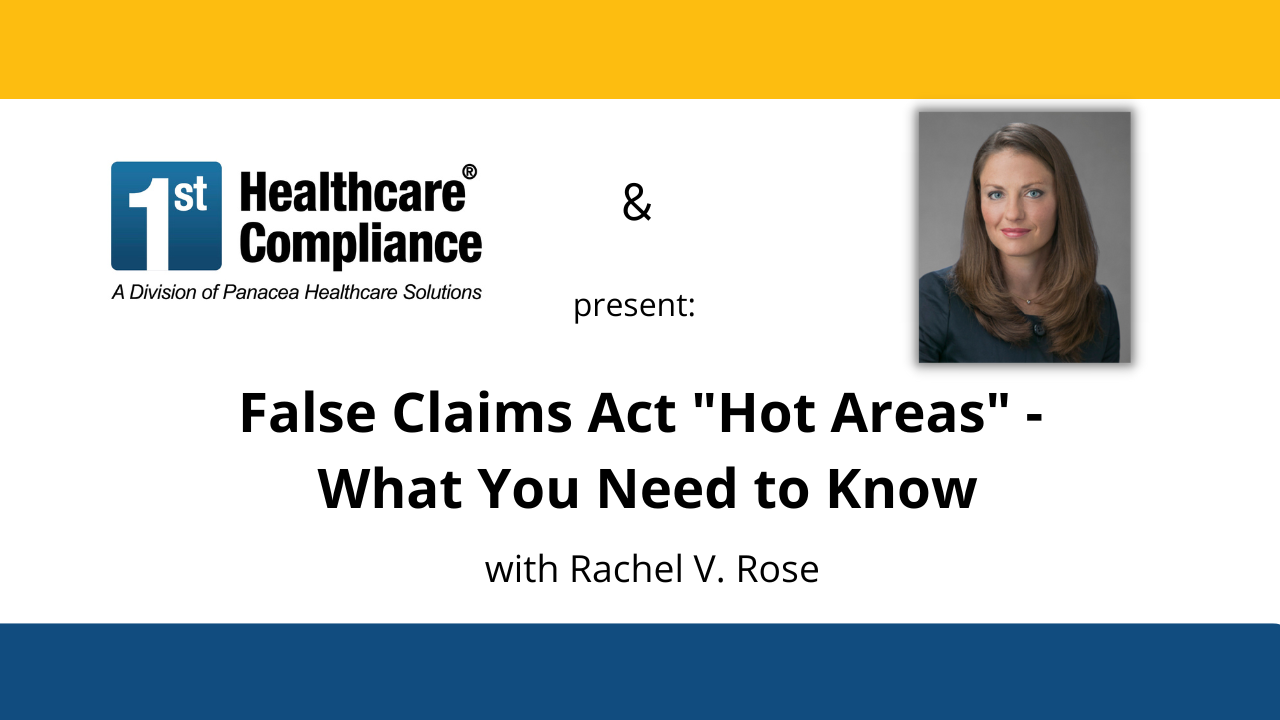How to Protect Your Healthcare Assets: Q&A
Highly-regarded attorneys Sean McKenna, Lauren Nelson, and Vincent Aiello of Spencer Fane LLP recently held the comprehensive webinar Preserving and Protecting Assets in Healthcare joined by Catherine Short and First Healthcare Compliance. Please see their bios at the end of this page.
Continue reading for Sean, Lauren, and Vince’s lively question and answer session related to enforcement and liability proceedings with asset protection, and explore government and private litigation matters.
What do you need to do in order to protect yourself from government investigations?
Lauren:
The government has really ramped up their civil and criminal investigations over the last year or two. And they have new initiatives that are really focused on recovering money spent on these alleged fraudulent claims. In the last year, they’ve really been focusing on telehealth claims submitted by labs, as well as pharmacies. And they’ve started the investigations into COVID funding and billing, as well as your PBMs. We expect the government will continue to ramp up the investigations in these areas as well as other potential areas. In addition, the different licensing boards have also resumed their unannounced surveys and inspections of provider sites.
To help protect yourself from investigations, the first thing is to have a full understanding of what these different potential risks are. To do this, you need to do a comprehensive and very strategic assessment of all potential risks throughout your organization. Frequently people talk about enterprise risk management. It really is a great approach because it looks at every different department of a health care system. And it’s important that not only do you do these risk assessments in each department, but you need to have the different groups communicate and work together. So, there’s coordination and a real appreciation for what those risks are.
Lauren, can you speak to the risk factors or components of a smaller organization versus those of a large institution or national company?
Lauren:
Yes, absolutely. It’s really about understanding what those potential risks are. If you can coordinate the efforts of these assessments, with the different departments you’re in, you will end up putting less strain and demand on the individual departments. And that results in a better understanding of the potential risks. It also gives you the capability of improving those potential problems that you can identify. One big area, as a defense attorney, I frequently deal with are patient medical records, and I always deal with risk management. What can be a little problematic is when there’s a lack of coordination between the IT department or the records department, and risk management. So, it’s important that everyone’s on the same page, and has a good understanding of what information is available.
What are common compliance issues you see in your practice, Lauren?
Lauren:
So, common compliance issues that we see… and I’m not going to list out every single one of these, but, common problems are issues with inappropriately providing copay assistance, not adhering to a contract, having a commercially unreasonable arrangement, retroactive payments or adjustments and things like that.
Sean, I’m sure you see a lot of this in your practice, right?
Sean:
Yes, absolutely. One of the biggest concerns from a compliance perspective that translates into potential monetary damages are these per click percentage-based arrangements. Those have been frowned on, they’ve been deemed non-compliant by Department of Justice and OIG in various states. We’re seeing a lot of those cases. Also, joint ventures. Those will continue to be at risk, the OIG has said. For decades, these are all Hot Topic issues along with those sectors that are being scrutinized that could result in some sort of monetary penalty or financial hit, not just monetary, but could be institutional, goodwill, morale, etc., all could have an impact on providers’ bottom line and could result in some sort of default, or some sort of other potentially private liability on the quality side.
Vince, can you discuss enforcement and potential liability, especially during the pandemic and onwards? What can you talk to us about kind of what individuals and executives and company’s clinicians can do to protect and preserve their assets?
Vince:
Absolutely. Before we get going into asset protection trusts, and some asset protection strategies, there’s a few caveats: one, asset protection, asset protection strategies work best when planning ahead. If you’re thinking that you’re going to set up an asset protection trust, at the last minute, after a claim has been filed, after an investigation has started, that’s generally a huge red flag.
If you’re not setting these trusts up at least a minimum of two years before any potential claim, then there’s a risk that they may not work. Also, these types of trusts aren’t a panacea to simply skirt liability and somehow say that you can engage in nefarious conduct or things that are criminal in nature. They don’t function in that capacity. With those sort of basic caveats in mind, I can kind of walk through the process of setting up an asset protection trust and what it is and what’s involved with that. Asset protection trusts have been around for quite some time, in their simplest way to think about them, they are a contract, there is a trust agreement, and they are a creature of statute, they are almost always an irrevocable trust. They are set up under the laws of particular states. Legislatures have expanded the scope of protections in various states and offer various degrees of creditor protection for the individuals that are setting up an asset protection trust.
An asset protection trust, essentially is a contract document. It allows you to preserve your assets, retain beneficial interests of those assets, and protect the assets from creditors. It’s highly effective if they’re set up ahead of time for entrepreneurs setting up all sorts of businesses, medical practices, medical service organizations, for business owners, for the individual employees that are functioning as directors or officers, CEOs, for doctors, and generally used for individuals with higher net worth. You’re not going to see an asset protection trust set up in a scenario where you are trying to preserve a few $100,000 in assets. Usually, these are going to be folks who have a few million dollars at risk and you’re setting it up to mitigate any potential risk of liability seizure and forfeiture that may come from all the things that Lauren and Sean discussed.
You mentioned potential red flags. What are the consequences when you see all these red flags? What can happen?
Vince:
Oftentimes, folks will come to me and they’ll say I want to set up an asset protection trust and I want to control everything. That’s a huge red flag. You’re going to have to be comfortable with moving your assets into an irrevocable asset protection trust, to preserve those assets for your benefit, but you can’t retain too much control over those assets. And this is sort of where the nuances of state law and trust drafting come into play. And really, it goes to how these documents aren’t formulaic. They need to be set up for the individual business owner, the professional doctor or person that is potentially subject to the to the liability of running a medical organization, doctor’s office and whatnot.
So, there are lookback periods, and the red flag that happens is that the doctor or business owner comes in and they say, “I think I’m under investigation, but I’m not sure.” And then, all of a sudden, they’ll say, “We need to take certain steps to protect my assets. I’ve never done that before, I have an LLC, but I’m concerned, I may have some liability.” If you race to set up an asset protection trust after the fact, both a civil attorney and a criminal prosecutor can file motions to have the judge look at the transfers into those trusts and set those transfers aside, essentially unwinding the value in the benefit the trust offers.
So, for example, in Nevada, and several other states, the look back period is two years. If a client comes to me today, and they want to start a new medical practice group, and they’re concerned about potential liability, perhaps they’ve invested a million dollars into the business, and they don’t want to lose the balance of their investments and holdings, they will want to set up this trust. As long as they’re doing that two years before they incur any potential liability, then they’re fine.
Sean, could you discuss on civil forfeiture because of your background and what you focus on in your practice?
Sean:
Civil forfeiture essentially means that we think there may be some sort of illegal, ill-gotten gains, and we’re going to take it until you claim it, and then have to justify how it’s not. And so now the burden shifts entirely on the individual whose funds have been seized. And this is a favorite of local law enforcement, as well as the feds, they can go in, along with a search warrant, or just on their own and seize a bank account, for instance. And then you must administratively make a claim and then litigate it as a mini trial and basically justify your existence. So, it’s extremely burdensome for an individual or business to try and justify and explain. It’s an exorbitant amount of time and effort to try and do a tracing or not tracing. Sometimes you can negotiate it and sometimes you can’t. But civil forfeiture is a very powerful tool for the Department of Justice (DOJ) and its agencies. You know, DEA, FBI, IRS, are the ones that typically use is the most.
What’s ahead, Lauren, any predictions for the year?
Lauren:
Sure. So, there are predictions that due to patients delaying receiving care, over the last couple of years, because of the pandemic, health care providers are anticipating an increased need for care, especially in the long-term care sector as well as care for chronic diseases, as well as behavioral health. And one thing that will be interesting to watch over the rest of the year, is the further integration and diversification of how that care is being provided. So, through telehealth, the integration from wearable devices and things like that, which, those issues, raise cybersecurity questions. There’s also a thought that there will be a greater level of investigation by the government and there’ll be greater scrutiny for FCA and AKS.
Vince, do you have further thoughts on our topic?
Vince:
I think my final thought is to plan for the future. In my practice, that’s key. If you’re in business now, and you haven’t planned, and you’ve got a concern, if you think you’ve got exposure, still plan now. It’s not too late. Whatever the big scary liability is that that is out there, there are ways to deal with that. It’s very unfortunate when folks come to my office too late. There’s very little we can do after the fact. So, that that’s my suggestion.
Sean McKenna, Lauren Nelson, and Vincent Aiello of Spencer Fane LLP
With 24 years of experience, Sean McKenna is a nationally-recognized defense attorney who focuses his practice on defending executives and providers in healthcare enforcement, litigation, and regulatory issues, under civil or administrative investigation by the U.S. DOJ, OIG, and Attorneys’ General Medicaid Fraud Control Units, as well as in criminal investigations and matters involving federal and state governments. As a former ten-year Assistant United States Attorney, Associate Counsel to the Inspector General, and General Counsel for the U.S. Department of HHS, Sean also assists clients with internal investigations, compliance reviews, as well as advising on their compliance with state and federal fraud and abuse rules.
 Lauren M. Nelson has 16-years of experience litigating across the country on behalf of healthcare providers and executives, including hospital systems, physicians, rehabilitation centers and other providers in complex medical malpractice actions, licensing matters, and other business disputes. She specializes in a variety of cases, from catastrophic birth and spinal cord injuries to misdiagnoses and failures to treat. Lauren also counsels and represents physicians and nurses before State and federal regulators and licensing boards in all manner of investigations, reviews, and inquiries.
Lauren M. Nelson has 16-years of experience litigating across the country on behalf of healthcare providers and executives, including hospital systems, physicians, rehabilitation centers and other providers in complex medical malpractice actions, licensing matters, and other business disputes. She specializes in a variety of cases, from catastrophic birth and spinal cord injuries to misdiagnoses and failures to treat. Lauren also counsels and represents physicians and nurses before State and federal regulators and licensing boards in all manner of investigations, reviews, and inquiries.
 Vincent Aiello helps business owners solve legal problems to secure revenue flow and reduce business risks. As a lawyer and business owner he has firsthand experience handling complex commercial litigation and transactional matters for his clients. His client base spans a broad spectrum of businesses including household-name consumer brands, banks, construction companies and family ventures. As legal counsel, he advises personal family foundations on managing and protecting their wealth. While each of his clients may take on a unique shape or size, they all face complex legal and business challenges, which is precisely where Vincent has focused his commercial legal practice.
Vincent Aiello helps business owners solve legal problems to secure revenue flow and reduce business risks. As a lawyer and business owner he has firsthand experience handling complex commercial litigation and transactional matters for his clients. His client base spans a broad spectrum of businesses including household-name consumer brands, banks, construction companies and family ventures. As legal counsel, he advises personal family foundations on managing and protecting their wealth. While each of his clients may take on a unique shape or size, they all face complex legal and business challenges, which is precisely where Vincent has focused his commercial legal practice.









